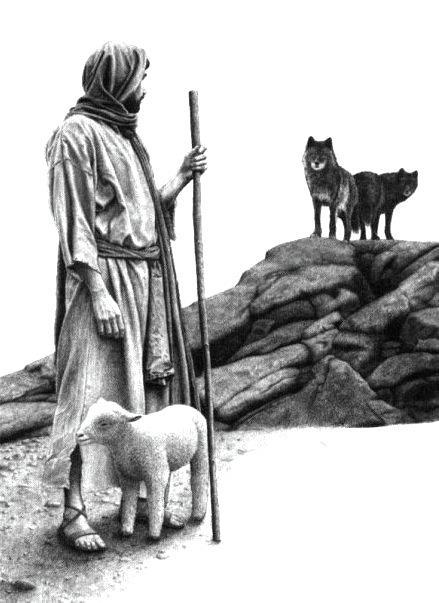
THEME: THE GOOD SHEPHERD
READINGS: Acts 13:14, 43-52/ Rev. 7:9, 14-17/ John 10:27-30
4th Sunday of Easter
‘I am the Good Shepherd; the Good Shepherd is one who lays down his life for his sheep’, says Jesus Christ (Jn. 10:11). To appreciate this statement of our Lord, who laid down His life on the cross for our salvation, let us first consider the use of the image of ‘shepherd’ in the Old Testament.
OLD TESTAMENT:
The Israelites saw their leaders or kings as shepherds (Ezek. 34). Above all, they saw God himself as their shepherd; hence we have the most popular psalm, which runs: ‘The Lord is my shepherd …’ (Ps. 23). Furthermore, in Ps. 80, they described the way God brought them safely from Egypt to the Promised Land like a caring shepherd leading his flock safely home. Several other Psalms refer to God as shepherd and his people as sheep or flock.
But what qualities did the Israelites of old see in ordinary shepherds that they referred to their leaders and even God as shepherds. William Barclay mentions the following as some of the qualities found among responsible shepherds in the earlier nomadic communities of Israel:
- they exercised constant vigilance over their flocks so that none of the animals went astray nor was attacked,
- they exhibited fearless courage in the face of wild beasts [because they were expected to produce evidence if any of the sheep was killed by a beast (Exo. 22:13); the evidence could be 2 legs of the sheep or an ear (Amos 3:12); remember David, before his battle with Goliath, told King Saul how he had rescued his father’s sheep from the mouth of lions and even killed lions and bears (1 Sam. 17:34-36)].
- some of them sacrificed their lives in the process of protecting the animals from wild beasts and armed robbers,
- they showed patient love for strayed sheep, and
- they were caring providers who led their flock to where they could feed.
While sometimes the Israelites were disappointed in their leaders for lacking the above shepherd-qualities (Ezek. 34), they saw all these qualities and more in God. So, for instance, when they said: ‘the Lord is my shepherd, there is nothing I shall want’ [they believed in his constant vigilance and caring provision].
NEW TESTAMENT
In the New Testament, Jesus, the Son of God, truly embodies all the above qualities; so he can rightly be called the GOOD SHEPHERD (John 10: 1-18).
- Constant Vigilance: Jesus constantly watches over us: ‘All that the Father gives me will come to me, and the one who comes to me I will by no means cast out. … This is the will of the Father who sent me, that I should lose none of those he has given me’ (John 6:37-39). We would be eternally grateful to him if we could see just one of his countless acts of vigilance over us: his protection against ‘spiritual anopheles mosquitoes’ which fly over us every night while we are asleep!
- Fearless Courage: Jesus knew what awaited him in Jerusalem, but in order to save us, he fearlessly went there, even in a public manner. Again, like a courageous shepherd fearlessly embracing the danger awaiting him, he told his disciples at the Last Supper: ‘All of you will be made to stumble because of me this night, for it is written, “I will strike the SHEPHERD, and the sheep will be scattered.”’ (Mark 14:27).
- Selfless Sacrifice: Jesus says, ‘I am the GOOD SHEPHERD, I lay down my life for my sheep. … I lay down my life of my own accord’ (John 10:11, 18). Out of love,he has offered the one perfect sacrifice to save us all.
- Patient Love: Jesus looks for the one lost sheep among the 100 sheep (Luke 15:1-7). Consider how many times we sin and yet he constantly looks for us and brings us to the Father.
- Caring Provider: Jesus said, ‘I am the door; if anyone enters, he will be saved, and will go in and out and find PASTURE. … I have come that you might have life and have it in abundance’ (John 10:9-10).
In the New Testament, the leaders of the church are also referred to us shepherds. Jesus, after his resurrection, told St. Peter to feed His sheep and lambs (Jn. 21:15-17). St. Peter took up the responsibility seriously and in his first letter he called upon other leaders of the church to be true shepherds.
Finally, borrowing the words of St. Peter, I pray that priests/pastors will ‘shepherd the flock which God has entrusted to [us], guarding it not out of obligation but willingly for God’s sake; not as [those] looking for profit but with a generous heart; [that we will] not lord it over those in [our] care, rather be an example to [our] flock. Then when the CHIEF SHEPHERD appears, [we] will be given a crown of unfading glory’ (1 Peter 5:2-4). Amen!
By Very Rev. Fr. John Louis
